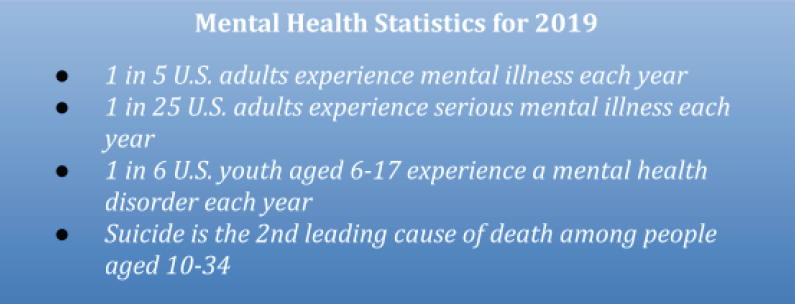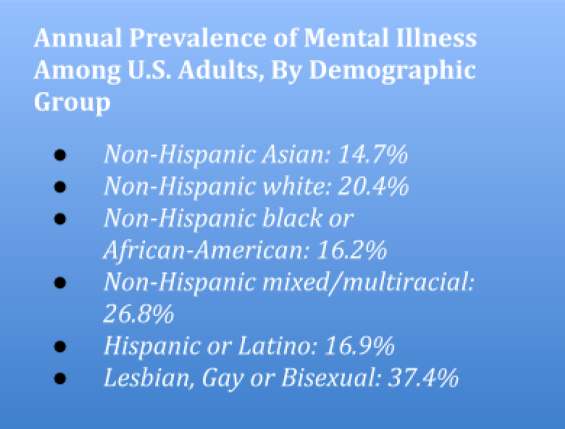For many people, the holiday season is not the “most wonderful time of the year.” Instead feelings of sadness, financial stress, isolation, loneliness, and unrealistic expectations leave many people longing for the end of the holiday season.
In fact, the National Alliance on Mental Illness (NAMI) reported in a 2014 survey that approximately 24% of people with a diagnosed mental illness found that the holidays made their condition “a lot” worse and 40% reported the holidays made their condition “somewhat” worse”.

What is Mental Illness?
Mental illness is defined as a health condition that impacts your emotions, thoughts, and behavior. Some examples of mental illness include anxiety disorders, depression, and addictive behaviors. We all experience sadness and worry from time to time. However, those impacted by mental illness experience persistent stress, emotional and physical symptoms, and face difficulty in multiple areas of their lives. If you notice that you or a loved one’s stressful symptoms are impacting the ability to function well at school, in social situations, or at work, then it can be an indicator that something more serious is going on and it’s time to ask for support.
Identifying the Signs of Depression
● Persistent sad, anxious, or “empty” mood
● Feelings of hopelessness or pessimism
● Irritability
● Feelings of guilt, worthlessness, or helplessness
● Loss of interest or pleasure in hobbies and activities
● Decreased energy or fatigue
● Moving or talking more slowly
● Feeling restless or having trouble sitting still
● Difficulty concentrating, remembering, or making decisions
● Difficulty sleeping, early-morning awakening, or oversleeping
● Appetite and/or weight changes
● Thoughts of death or suicide, or suicide attempts
● Aches or pains, headaches, cramps, or digestive problems without a clear physical cause and/or that do not ease, even with treatment

Recognizing Signs of Anxiety
● Restlessness, feeling wound-up, or on-edge
● Easily fatigued
● Difficulty concentrating; mind going blank
● Irritability
● Muscle tension
● Difficulty controlling feelings of worry
● Sleep problems, such as difficulty falling or staying asleep, restlessness, or unsatisfying sleep
Managing your mental health can be challenging under the best circumstances and it can be especially difficult during the holiday season. For those with mental health issues, the added stress and pressures of the holiday can cause symptoms to intensify. As the holidays are often associated with family time, this can impact the entire family. Here are some factors that contribute to increased mental health symptoms and stress during the holiday:
-
Pre-existing medical and/or mental health challenges: Families dealing with illnesses such as the illness of a child, sibling, parent, etc. may not be at their best. They are likely not sleeping well and their tolerance level may be low.
Undiagnosed and untreated mental health problems can also be hard on families. Often, there can be more than one person struggling at the same time and it can be challenging to take care of oneself while trying to manage what is happening around you.
Caregivers who are trying their best to take care of their impacted family members often struggle too. The physical, mental, and emotional challenges of caregiving can deplete one’s emotional reserve.
-
Recent losses: Recent losses and anniversaries of significant losses can dampen one’s mood over the holiday and trigger feelings of loneliness. There is no time for grief and loss is forever.
-
Finances: For families experiencing financial issues, there can be pressures related to spending money on things above and beyond what you usually would. Pressure to keep up with the Jones’. It’s not uncommon for people to go into debt due to holiday spending. Getting an extra job to pay for holiday expenses may give you more money, but it can also add stress.
-
Expectations of self and others: In families oftentimes there are roles that we take on, with spoken and unspoken expectations – especially around the holidays. For example, what are your family’s messages and expectations about gift giving? Do you have expectations about how others should behave on a holiday compared to the rest of the year? We are all guilty of “shoulds” – telling ourselves what we “should” do and feel, and what others “should” do, and how they “should” behave.
“Comparison is the thief of joy” – Theodore Roosevelt.
-
Family history of conflict and negative interactions: Unfortunately, family conflicts don’t go away because it’s the holiday season. Though it may not be on the surface, unresolved issues can easily come to a head. You may be having anxious feelings about the day. Perhaps wondering what if this or that happens and anticipating possible conflicts.
-
Alcohol and drug use: self-medicating with drugs and alcohol exacerbates symptoms and impairs judgment.
For more assistant or information on how to manage your holiday season contact us today.

